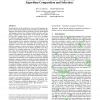Free Online Productivity Tools
i2Speak
i2Symbol
i2OCR
iTex2Img
iWeb2Print
iWeb2Shot
i2Type
iPdf2Split
iPdf2Merge
i2Bopomofo
i2Arabic
i2Style
i2Image
i2PDF
iLatex2Rtf
Sci2ools
109
Voted
PLDI
2006
ACM
2006
ACM
Context-sensitive domain-independent algorithm composition and selection
Progressing beyond the productivity of present-day languages appears to require using domain-specific knowledge. Domain-specific languages and libraries (DSLs) proliferate, but most optimizations and language features have limited portability because each language’s semantics are related closely to its domain. We explain how any DSL compiler can use a domain-independent AI planner to implement algorithm composition as a language feature. Our notion of composition addresses a common DSL problem: good library designers tend to minimize redundancy by including only fundamental procedures that users must chain together into call sequences. Novice users are confounded by not knowing an appropriate sequence to achieve their goal. Composition allows the er to define and call an abstract algorithm (AA) like a procedure. The compiler replaces an AA call with a sequence of library calls, while considering the calling context. Because AI planners compute a sequence of operations to reach a ...
| Added | 14 Jun 2010 |
| Updated | 14 Jun 2010 |
| Type | Conference |
| Year | 2006 |
| Where | PLDI |
| Authors | Troy A. Johnson, Rudolf Eigenmann |
Comments (0)

